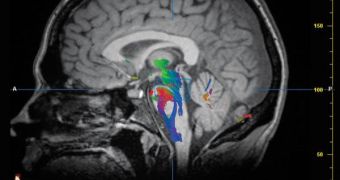University of California in Los Angeles (UCLA) neuroscientist Andrew Frew is currently in charge of a research team that plans to unlock the secret of human cognitive skills and intelligence. The way the scientists plan to do that is by carefully and methodically observing the wiring patterns inside the cortex, and how various areas of the brain are connected to each other. The individual thickness of nerve cells, their path, their number, and the way they are connected could provide us in the near future with answers to the very old question of what makes us intelligent, Technology Review reports.
Over the years, scientists have relied on using imaging techniques such as Magnetic Resonance Imaging (MRI) to look inside the brain and determine the structure of dark matter and the way it influences our cognition. But, despite progresses, it's now becoming obvious that it's impossible to explain such an abstract and complex phenomenon as intelligence using gray matter alone. White matter, the swirls of nerve cells that help connect gray matter and keep other neurons together, may also play a very important role in the process, the UCLA scientists believe.
“Scientists are now able to switch the focus from particular regions of the brain to the connections between those regions,” McGill University Montreal Neurological Institute psychiatrist and neuroscientist Sherif Karama says. The expert is part of a growing number of researchers who believes that the way information is carried through the brain via the white matter and the way this matter is wired may be a determining factor in establishing the measure of a person's intelligence, according to the Intelligence Quotient (IQ) scale.
“If you want to understand cognitive decline, you need to understand how cognition is manifested and put together in the brain,” Mind Research Network neuroscientist Rex Jung adds. “It's not a wild guess to say that sometime in the future, brain scans will be part of a group of tools that try to indicate what level someone's ability is going to be,” McMaster University Michael G. DeGroote School of Medicine neuroscientist Sandra F. Witelson shares. She believes that, soon, MRI could be used as part of a test to estimate a child's future IQ.

 14 DAY TRIAL //
14 DAY TRIAL //